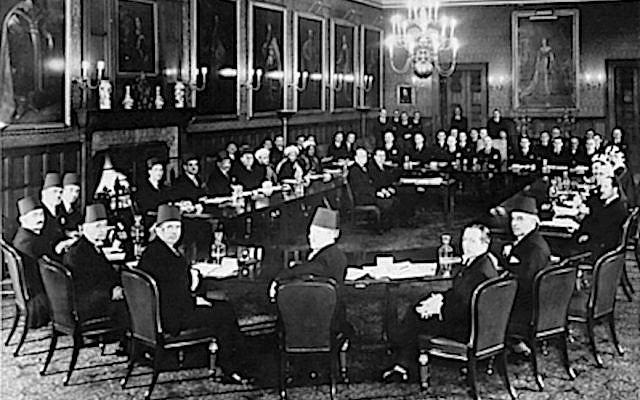by Steven E. Zipperstein
Hat tip: Dr. Jean-Charles Bensoussan
Early 20th century legal positions claiming the territory was part of Syria, and later Jordan, undermine the 21st century Palestinian claim to statehood
 |
| London Conference, St. James' Palace, February 1939. Palestinian delegates (foreground), left to right: Fu'ad Saba, Yaqub Al-Ghussein, Musa Alami, Amin Tamimi, Jamal Al-Husseini, Awni Abd al-Hadi, George Antonious, and Alfred Roch. Facing the Palestinians are the British, with Sir Neville Chamberlain presiding. (PD via Wikipedia Commons) |
The thrust of the Palestinian legal case today is that Palestine is a centuries-old geopolitical entity whose residents are entitled to statehood as a matter of international law. But that has not always been the Palestinians’ legal position.
Immediately following World War I and continuing through most of the British Mandate period (1922-1948), Palestinian lawyers and witnesses argued repeatedly before various tribunals that there was no such place as “Palestine.” Instead, they claimed the area known colloquially as “Palestine” was in fact part of Syria, or “southern Syria” to be precise. Following the Israeli War of Independence, the Palestinians changed course and pledged their loyalty to Jordan.
It seems unthinkable that any Palestinian lawyer or legal scholar would argue today that Palestine is part of Syria or Jordan, but those were the predominant Palestinian legal positions from the end of World War I until the Six Day War.
For example, in November 1918 a Palestinian Arab group filed a petition with the French Commissariat in Jerusalem “begging that Palestine might be formally included in Syria.”
In February 1919 the Arab Delegation from Palestine to the Versailles Peace Conference submitted a formal petition urging that rather than be recognized as an independent state, Palestine should be deemed part of and merged into Syria. The petition said, “We consider Palestine as part of Arabic Syria as it has never been separated from it at any time. We are connected with it by national, religious, linguistic, natural, economical and geographic bonds . . . In view of the above we desire that our distinct Southern Syria or Palestine should not be separated from the Independent Arabic Syrian Government.”
The Arab legal argument that there was no such political entity as “Palestine” continued after the League of Nations awarded the Palestine Mandate to Britain in 1922. For example, in 1925 Jamal Effendi-Husseini, a prominent Palestinian Arab, challenged a decision of British High Commissioner Sir Herbert Samuel allowing local postage stamps to bear an inscription in Hebrew identifying the country as “Palestine E.I.” (Palestine Eretz Israel).
Husseini’s lawyer, Auni Bey Abdul Hadi, argued to the court that “Palestine” was “not an Arab word.” Auni Bey insisted the correct name of the country was “Southern Syria.” “Palestine,” he argued, had no separate existence and was in fact part of Syria.
Following the Hebron Massacre in late August 1929, the British Government convened an inquiry commission under the leadership of Sir Walter Shaw. A witness for the Arab side, Saleem Farah, testified under oath on November 27, 1929 that prior to World War I, Palestine was never regarded as a separate political entity.
The Grand Mufti of Jerusalem, Haj Amin al Husseini, also testified before the Shaw Commission. The Mufti conceded in his testimony that the League of Nations Mandate for Palestine granted political rights in Palestine to the Jews, but not to the Arabs.
Many other prominent Arabs also argued Palestine should have been regarded as part of Syria. George Antonius, author of the acclaimed book “The Arab Awakening,” testified before the Palestine Royal Commission (the Peel Commission) on January 18, 1937 in Jerusalem. Antonius spent a considerable portion of his testimony arguing Palestine had always been part of Syria. He noted “Palestine has always been an integral part of Syria and that what was common to Syria was common to Palestine.”
Following the Israeli War of Independence, the Palestinians declared their allegiance to King Abdullah I of Jordan at the Jericho Conference in December 1950. Abdullah invoked the resolutions adopted at the conference as the legal basis for Jordan’s annexation of the West Bank.
Lack of transparency
Does any of this arcane history matter today? Yes, it does.
The early 20th ccentury Palestinian legal position negating the existence of “Palestine” in favor of Syria undermines the 21st century Palestinian claim to statehood.
Moreover, the Mufti’s 1929 concession that the Mandate granted no political rights to the Palestinian people contradicts the arguments of some modern Palestinian lawyers that the Mandate remains in effect today and grants sovereignty and statehood to the Palestinian Arabs.
And the Palestinian rejections of offers of statehood from Great Britain in May 1939 and from the United Nations in November 1947, their pledge of loyalty to King Abdullah in December 1950, and the language in Article 24 of their original May 1964 charter disclaiming sovereignty over the West Bank and Gaza, all stand in discontinuity with their current legal position.
The Palestinians have every right to change their legal position. But when lawyers abandon old arguments and replace them with new ones, they need to be transparent with the courts. Some judges may view a major shift in position as a sign of weakness regarding either the prior or the new argument.
Unfortunately, Palestinian lawyers and their supporters have not been transparent with the International Court of Justice and the International Criminal Court about their prior inconsistent legal positions. The judges in those tribunals should require the Palestinian lawyers to justify how they can now assert sovereignty over territory they previously renounced in favor of Syria and later in favor of Jordan.
Steven E. Zipperstein
Source: https://blogs.timesofisrael.com/back-when-palestinians-insisted-theres-no-such-place-as-palestine/
No comments:
Post a Comment